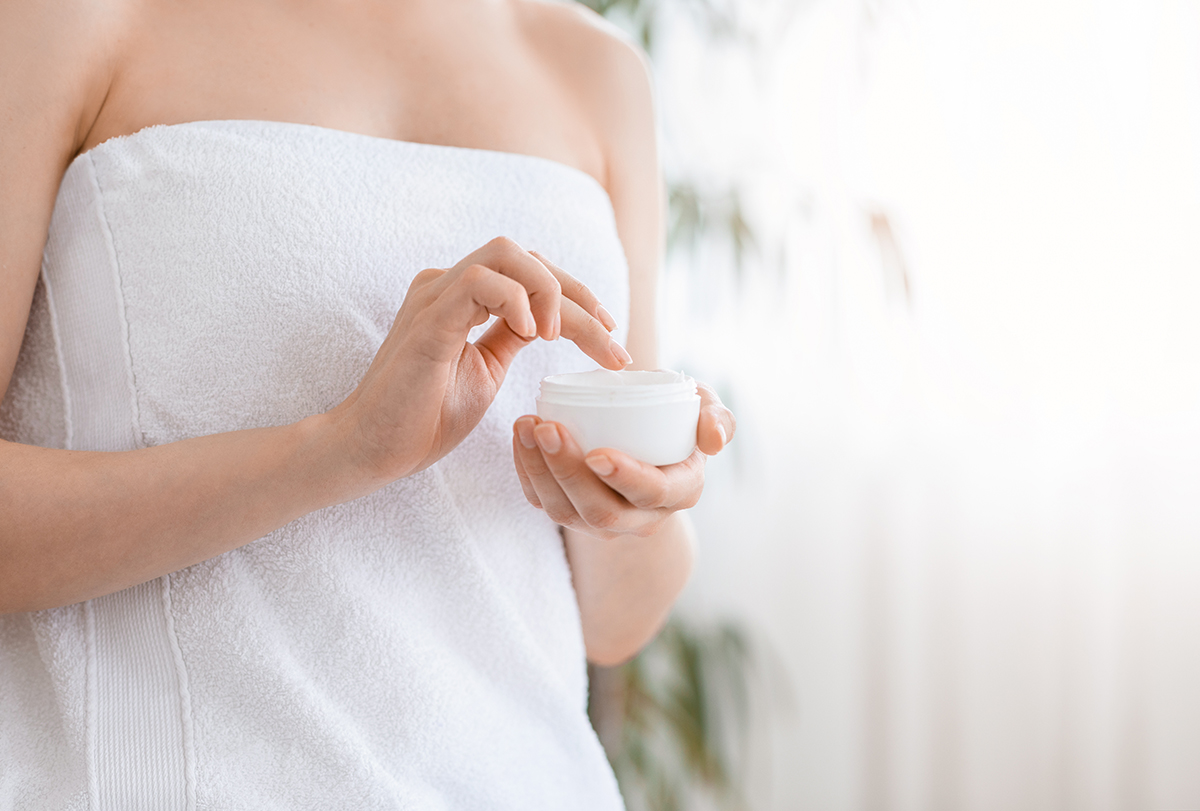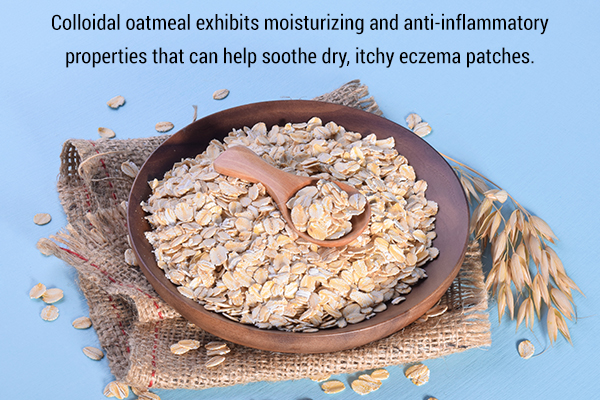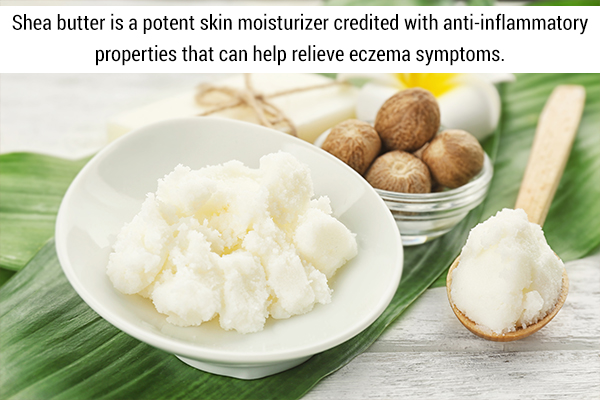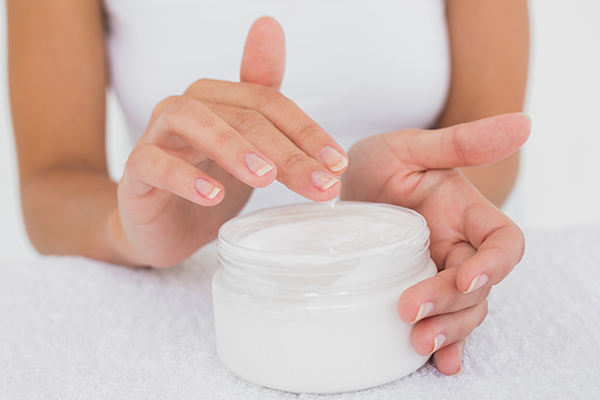In this article:
Eczema, also known as atopic dermatitis, is an inflammatory skin disorder characterized by dry, scaly, and itchy patches that can develop anywhere on the body, sometimes with small fluid-filled blisters. It is a chronic condition that can flare up anytime of the year but particularly during the arid winter season. (1)

There is no permanent cure for eczema yet, but you can manage it with proper medication and self-care. This article will share some useful remedies, tips, and lifestyle changes that can help reduce the severity and frequency of eczema flare-ups.
Factors That Trigger Winter Eczema
Here are a few common factors that can trigger or worsen eczema symptoms, particularly during the winter season:
- Direct or excessive exposure to the dry winter air when outdoors can make your uncovered skin dry and itchy.
- Taking long hot baths or showers strips away the natural lipids from your skin, making it excessively dry.
- People with diabetes suffer from poor blood circulation, which makes them more prone to eczema flare-ups.
- Atopy is a problem with the immune system due to genetic abnormalities that increase your chance of developing allergic diseases.
- Not moisturizing your skin regularly or doing it with the wrong products, such as tinted or thin-consistency lotions and gels, can aggravate eczema.
- Using indoor heating systems, such as electronic heaters or radiators, can suck the moisture from your room air, adding to the skin dryness and exacerbating eczema.
- Sitting too close to heating systems can also dry out your already-sensitive skin.
- Wearing multiple layers of clothes, tight clothes, or synthetic fibers can suffocate your skin by preventing proper airflow.
- Coarse fabrics, such as woolen knitwear, rub against eczema-ridden skin, further causing irritation or damage.
Home Remedies for Winter Eczema
Here are some home remedies that can help you manage eczema better, especially in the winter season:
1. Colloidal oatmeal

Colloidal oatmeal exhibits moisturizing and anti-inflammatory properties that can help soothe dry, itchy eczema patches. (2)
How to use:
- Mix oatmeal powder and just enough milk or water to make a thick, smooth paste. You can add some honey to the mixture for added hydration. Gently rub the mixture on the affected skin. Leave it on for 15 minutes before rinsing it off.
- Alternatively, you can mix some colloidal oatmeal in your bathwater and soak in it.
2. Coconut oil
Coconut oil is a great moisturizer that can hydrate and calm dry, irritated skin. It also helps curb the underlying inflammation to make your skin less itchy and tender.
How to use:
Gently massage a few drops of this oil directly on your affected skin like you would apply a regular moisturizer.
3. Vitamin E

Vitamin E is a powerful antioxidant that neutralizes the skin-damaging activity of free radicals.
The outer walls of skin cells contain polyunsaturated fatty acids that give your skin its natural moisture. Free radicals are basically unstable molecules that attack these walls to leak out the lipids, making your skin utterly dry and aggravating eczema.
Vitamin E is a fat-soluble nutrient that gets dissolved in these oils. It fights off the onslaught of free radicals to preserve the structural integrity of your skin.
4. Ceramides
Ceramides are waxy lipids that are naturally present in healthy skin barriers. They form an impervious layer over the skin to prevent transepidermal water loss while also blocking out external irritants and impurities.
In short, ceramides help moisturize and protect eczema-ridden skin while it heals. This intensive hydration also subdues the symptomatic discomfort associated with eczema, such as burning, dryness, and itch.
5. Shea butter

Shea butter is a potent skin moisturizer credited with anti-inflammatory properties that can help relieve eczema symptoms. It also contains cetyl esters that help lock the moisture within the skin for prolonged hydration.
6. Petroleum jelly
Petroleum jelly forms a protective layer over the skin that prevents moisture loss and strengthens its barrier function while the skin repairs itself. (3)
How to use:
- Wash your skin with warm water to open your pores. Gently dab some of the jelly on the affected area.
- If you don’t have petrolatum jelly, you can use beeswax instead.
Ways to Deal With Winter Eczema
Try these measures to keep your eczema under control during the cold months:

- Install a humidifier to restore moisture to your arid living environment during winter. Ideally, your home environment should neither be too cold nor too warm and the humidity should be between 45% and 55%. A less expensive alternative is to place a bowl of warm or steaming water in each room. Make sure to clean your humidifier or bowls regularly to prevent the growth of mold. Also, open your windows from time to time for a couple of minutes to allow proper ventilation inside the house.
- Use oil-based or petroleum-based moisturizers rather than water-based ones and make sure they are devoid of potential skin irritants such as fragrance, alcohol, and menthol. Moisturize regularly and reapply as soon as your skin starts to feel dry again. Ointments are particularly thick and provide deep hydration, making them ideal for low-humidity weather and severely dry skin. However, they can also trigger a lot of perspiration, so it’s best not to apply them on poorly ventilated parts of the body that remain hot and sweaty. Since your hands and face are not covered by clothes, they get directly exposed to the dry winter wind and require extra hydration. Also, keep your lips protected with an extra layer of an emollient ointment or petroleum jelly.
- Replace your tinted sunscreen lotions with heavy-duty moisturizing ointments that exhibit broad-spectrum activity against both UVA and UVB with an SPF of at least 30. You can easily get such 2-in-1 products that offer both sun protection and intensive skin hydration.
- Wear multiple layers of clothes to keep your body warm, and strip away the layers if you start to feel too hot. Putting on one heavy garment can overheat the body, which is not good for eczema-affected skin. Similarly, cover yourself with multiple layers of bed linen rather than one thick duvet so you can conveniently shed the layers as needed.
- Keep your hands protected from the harsh winter air by wearing gloves when stepping out. People with a chromate allergy should avoid leather gloves or line them with a pair of silk ones to avoid direct contact with the skin.
- Woolen gloves can also be rough against the skin, so it’s recommended to wear soft silk gloves underneath them.
- Take short baths (less than 15 minutes) with lukewarm water (not more than 30°C) to avoid overdrying your skin, and moisturize immediately after while your body is still a little damp. Also, go for mild nonfoamy cleansers that are gentle on the skin, preferably ones that contain moisturizing ingredients.
- Pat your wet skin dry with a towel after taking a bath. Rubbing further irritates the already compromised skin barrier.
- Don’t sit too close to fires and radiators as this will expose your skin to direct high-intensity heat that can exacerbate the dryness and trigger itching.
- Stay away from all kinds of smoke as it releases free radicals and dries out your skin, thereby worsening your eczema symptoms.
- Change out of wet clothes and shoes immediately as the dampness can make your eczema-ridden skin vulnerable to infections.
- Drink enough water to keep your skin hydrated from within.
- Identify and record things that trigger or worsen your eczema, and avoid them the best you can. These triggers can range from foods, fabrics such as wool, detergents, bubble baths, deodorizing washing liquid, and even pet dander. These factors combined with winter can make your condition worse, and so it is important to avoid these triggers vigilantly.
- Don’t use fragrant detergents and fabric softeners as they contain harsh chemicals that can get transferred to your skin and flare up eczema. Also, avoid using dryer sheets or antistatic sheets that can irritate your sensitive skin.
- Always wash new clothes before wearing them to remove traces of finishing chemicals added at the time of manufacturing that can trigger sensitivity or allergic skin reactions, such as formaldehyde, flame retardants, and dyes.
- Coming down with a bacterial or viral infection can also worsen eczema, so it’s vital to get it treated as soon as possible.
- Don’t scratch your skin no matter how itchy it gets. Scratching may provide temporary relief but ends up reinforcing and intensifying the itch. Also, rubbing your fingernails against your sensitive skin damages it further; this can lead to thickening of the tissue over time, resulting in more noticeable plaques of eczema. Plus, the friction creates tiny tears in the skin that provide easy entry to infection-causing germs, which may be transferred from your contaminated fingers.
- Apply a cool compress or refrigerated moisturizer to the itchy skin for instant relief. This topical cold therapy helps numb the underlying nerve ending to alleviate the itch, but only for a short period.
- You can use a low-strength OTC hydrocortisone ointment to curb the underlying inflammation that makes your eczema skin itchy and dry. Make sure to use it as directed. If it doesn’t work, consult your doctor for a stronger topical steroid. Your doctor may also prescribe oral medications such as diphenhydramine, which is an antihistamine that blocks the inflammatory reaction in the body.
- Biologic medications are now becoming available for atopic dermatitis too. You can also discuss the use of occlusions with your doctor.
- Keep your fingernails short and properly filed.

Final Word
Eczema is a chronic condition that can give rise to a lot of discomfort and secondary skin issues if left untreated. However, if you seek timely treatment and commit to it wholeheartedly, you can minimize your flare-ups to a great extent.
Simple remedies and self-care measures may relieve mild symptoms, but they may not work for severe or advanced cases. It is best to let your doctor guide you through the management of this long-term illness.
- Was this article helpful?
- YES, THANKS!NOT REALLY


